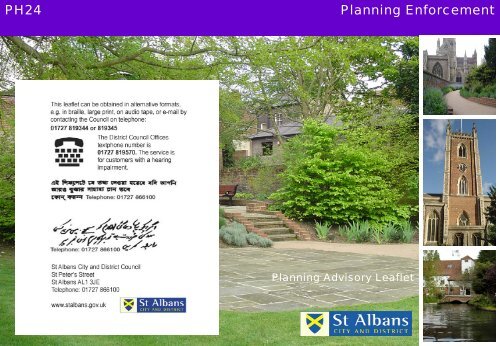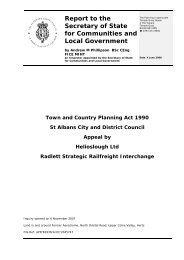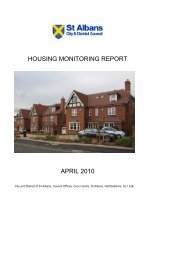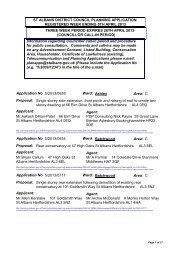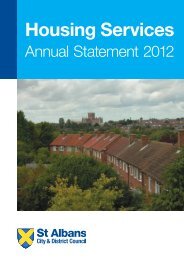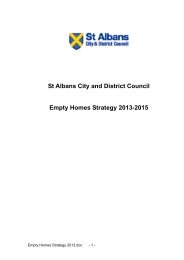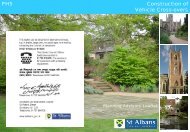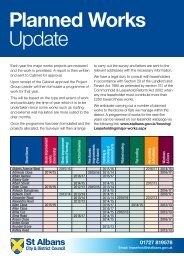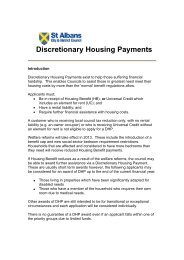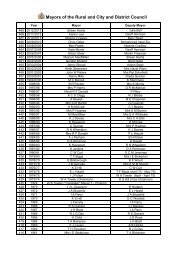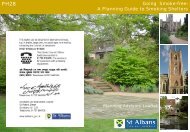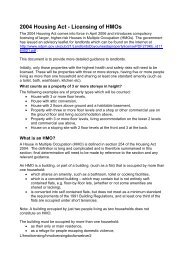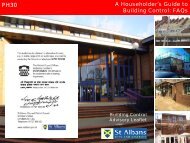Planning Enforcement - St Albans City & District Council
Planning Enforcement - St Albans City & District Council
Planning Enforcement - St Albans City & District Council
Create successful ePaper yourself
Turn your PDF publications into a flip-book with our unique Google optimized e-Paper software.
PH24<br />
<strong>Planning</strong> <strong>Enforcement</strong><br />
<strong>Planning</strong> Advisory Leaflet
PLANNING ENFORCEMENT<br />
Introduction: Why enforce?<br />
<strong>Planning</strong> regulations and policies are put in place to help protect<br />
and enhance the amenity and environment in our towns, cities and<br />
countryside. In an ideal world, development would be carried out<br />
properly and in compliance with regulations and policies. No<br />
planning enforcement would then be required. Unfortunately this is<br />
not the case and breaches do occur. A breach could be the result of<br />
a deliberate disregard of the planning regulations or simply a lack of<br />
knowledge of the relevant provisions. In these situations, planning<br />
enforcement officers are needed to ensure the amenity and<br />
environment of <strong>St</strong> <strong>Albans</strong> and <strong>District</strong> is protected and maintained.<br />
Where development has taken place without the required planning<br />
permission or where it fails to comply with the requirements of a<br />
permission, the <strong>Council</strong> can take enforcement action and can, as a<br />
last resort, prosecute any person undertaking work that is<br />
unauthorised. This leaflet outlines the planning enforcement<br />
process at <strong>St</strong> <strong>Albans</strong> <strong>District</strong> <strong>Council</strong>.<br />
To find out whether any works you propose require planning<br />
permission please visit the Customer Service Centre at the <strong>Council</strong><br />
offices or see the leaflet “A Householder’s Guide to Permitted<br />
Development Rights” available on the <strong>Council</strong> website. <strong>Planning</strong> or<br />
enforcement officers will also be able to provide you with guidance<br />
but you should be aware that this is an informal view only and not<br />
binding on the officer or the <strong>Council</strong>. For a formal decision, you<br />
will need to apply for a Certificate of Lawfulness.<br />
What does enforcement involve?<br />
The <strong>Planning</strong> <strong>Enforcement</strong> section at <strong>St</strong> <strong>Albans</strong> <strong>City</strong> and <strong>District</strong><br />
<strong>Council</strong> investigates around 1,500 complaints/enquiries a year<br />
about alleged breaches of planning control received from the<br />
general public, <strong>District</strong> <strong>Council</strong>lors, Town and Parish <strong>Council</strong>lors<br />
and via referrals from other departments within the <strong>Council</strong>.<br />
1<br />
The <strong>Council</strong>’s enforcement officers are involved in the following:<br />
investigating alleged breaches of planning control. This could<br />
include: general works undertaken in respect to buildings and<br />
properties, unauthorised fly-posting and advertisement<br />
displays, works undertaken to listed buildings, works<br />
undertaken in Article 4 Areas and conservation areas;<br />
checking compliance with conditions on planning consents,<br />
and the discharge of planning conditions;<br />
checking compliance with Section 106 legal agreements;<br />
assisting in the processing of certificates of lawful use or<br />
development;<br />
providing reports to planning committees on breaches of<br />
planning control;<br />
preparing evidence for enforcement and/or prosecution<br />
proceedings;<br />
responding to telephone requests for planning information and<br />
advice;<br />
posting of site notices for planning and other applications;<br />
maintaining the Register of Telecommunication Apparatus;<br />
processing applications for Goods Vehicle Operators Licences;<br />
investigating retrospective applications that have been refused<br />
planning permission;<br />
liaising with all departments within the <strong>Council</strong>.<br />
What should you do if you suspect a breach of planning<br />
control<br />
If you suspect a breach of planning control, you should contact the<br />
<strong>Planning</strong> <strong>Enforcement</strong> section as soon as possible. You may submit<br />
your complaint or enquiry in writing, by letter or email (details at the<br />
end of this leaflet), or by calling 01727 819346. As enforcement<br />
officers are often out investigating complaints, there are occasions<br />
when you may need to leave details on an answering machine<br />
service.<br />
When reporting any alleged breach please provide as much<br />
information as possible. Providing accurate details of the postal<br />
address of the premises or site can help to speed up the initial<br />
investigation.<br />
2
The <strong>Council</strong> will ask any person reporting a breach of planning<br />
control or making an enquiry to provide their contact details. This is<br />
to allow the enforcement officers to update the person on the<br />
progress of the case and also to provide a contact should any<br />
further information be required. All complaints and enquires are<br />
dealt with under strict confidentiality and every effort is made to<br />
safeguard this.<br />
You are not, however, required to supply your contact details if you<br />
do not wish to do so. An anonymous complaint or enquiry will be<br />
considered in the same manner as any other complaint or enquiry.<br />
Despite measures to improve the manner in which the service is<br />
provided, it is unlikely that it will be possible to meet everyone’s<br />
expectations. There will always be a need to prioritise the use of<br />
available resources to reflect the nature of the alleged breach,<br />
ongoing other commitments and the commitment to securing<br />
results. The <strong>Council</strong> investigates all reported breaches of planning<br />
control, but will give special priority to certain referrals such as<br />
breaches that are causing serious immediate harm or require<br />
emergency action, for example the demolition of a Listed Building.<br />
Many of the 1,500 complaints investigated each year are found to<br />
be works carried out under what is known as ‘permitted<br />
development’ rights. For example, you may be concerned that your<br />
neighbours have erected a large structure in their garden without<br />
planning permission. However, they may be fully entitled to do this<br />
lawfully under permitted development rights. <strong>Enforcement</strong> officers<br />
will, of course, investigate every complaint made, but you might<br />
wish to view the <strong>Council</strong>’s leaflet, A Householder’s Guide to<br />
Permitted Development Rights, to see if this is the case before you<br />
contact the enforcement section.<br />
What happens to your enquiry or complaint?<br />
Once a complaint or enquiry has been received by the <strong>Planning</strong><br />
<strong>Enforcement</strong> section, it will be allocated to an officer, who will aim to<br />
investigate the complaint or enquiry within five working days and<br />
advise you of his/her initial findings. Should a breach of planning<br />
control be identified, enforcement action may then be considered.<br />
How is enforcement undertaken?<br />
Many breaches of planning control reported to the <strong>Council</strong> are very<br />
minor, and formal action cannot always be justified. The Local<br />
<strong>Planning</strong> Authority must consider whether the breach of planning<br />
control would unacceptably affect the public amenity of the existing<br />
use of the land and buildings. <strong>Enforcement</strong> should always be<br />
commensurate with the breach of planning control to which it<br />
relates. <strong>Enforcement</strong> powers are discretionary and even when it is<br />
technically possible to take enforcement action, in law the <strong>District</strong><br />
<strong>Council</strong> is first required to determine whether such formal action<br />
would be ‘expedient’. In each case, all the relevant planning<br />
circumstances must first be considered and any of the following<br />
may be appropriate.<br />
1. Ongoing review: Take no action, but monitor the position in<br />
case circumstances change. This might involve minor<br />
breaches of planning control causing no significant harm.<br />
2. Allow time to remedy: Time may be given to remedy the<br />
breach of planning control or to consider whether any<br />
unauthorised development should be retained, for example by<br />
requesting the submission of a planning application. This may<br />
be considered appropriate in circumstances where the harm is<br />
easily repairable and is not so serious as to warrant immediate<br />
action.<br />
3. <strong>Planning</strong> Contravention Notice: Service of this type of<br />
Notice is a primary method of gaining information about an<br />
alleged breach of planning control. It gives clear warning that<br />
further action is being considered and can in itself bring about<br />
a satisfactory conclusion.<br />
4. <strong>Enforcement</strong> Notice: Service of such a Notice will be the<br />
normal means of remedying unacceptable development where<br />
the <strong>Council</strong>’s investigations have not met with a satisfactory<br />
response. The Notice will specify the actions that need to be<br />
undertaken to remedy any unauthorised development. There is<br />
a right of appeal to the Secretary of <strong>St</strong>ate against the Notice,<br />
which can be quashed or amended on appeal.<br />
3<br />
4
5. The <strong>Council</strong> may choose to ‘under-enforce’ to remedy a<br />
specific problem. In such circumstances the remaining building<br />
or use will be deemed to have planning permission when an<br />
<strong>Enforcement</strong> Notice is complied with. The <strong>Council</strong> may choose<br />
not to issue proceedings against certain aspects contained in<br />
the <strong>Enforcement</strong> Notice. Under-enforcement will only be used<br />
when the planning merits are clear, unarguable and third<br />
parties are not adversely affected.<br />
6. Discontinuance Notice: Service of such a notice allows the<br />
<strong>Council</strong> to take action against any advertisement, or the use of<br />
any advertisement site, which might normally have the benefit<br />
of deemed consent. Discontinuance action can only be taken if<br />
the <strong>Council</strong> is satisfied it is necessary to do so to remedy a<br />
substantial injury to the amenity of the locality or a danger to<br />
members of the public.<br />
7. Breach of Condition Notice: A Breach of Condition Notice<br />
can be used in addition to, or as an alternative to, an<br />
<strong>Enforcement</strong> Notice where an activity is in breach of a<br />
condition attached to a planning permission. There is no right<br />
of appeal against this Notice and under-enforcement is not an<br />
option.<br />
8. <strong>St</strong>op Notice: The <strong>St</strong>op Notice procedure allows the Local<br />
<strong>Planning</strong> Authority to impose a ban almost immediately on<br />
activities that are being carried out in breach of planning<br />
control. A <strong>St</strong>op Notice can only be served if there has been a<br />
prior service of an <strong>Enforcement</strong> Notice, and it prohibits the use<br />
or operation even if an appeal has been made against the<br />
<strong>Enforcement</strong> Notice. Government advice is that a <strong>St</strong>op Notice<br />
should only prohibit what is essential to safeguard amenities or<br />
public safety in the neighbourhood, or to prevent serious or<br />
irreversible harm to the environment in the surrounding area.<br />
9. Temporary <strong>St</strong>op Notice: A Temporary <strong>St</strong>op Notice<br />
(introduced by the <strong>Planning</strong> and Compulsory Purchase Act<br />
2004) may be issued where it appears to the Local <strong>Planning</strong><br />
Authority that there is a serious breach of planning control and<br />
to allow time to investigate the breach fully or to issue an<br />
<strong>Enforcement</strong> Notice.<br />
5<br />
10. Court Injunction: An injunction can be sought by the Local<br />
<strong>Planning</strong> Authority from the County Court or High Court in the<br />
most serious cases where irreparable harm is being done,<br />
where a flagrant breach is resulting in clear financial gain to<br />
the individual or where all other actions have failed. Significant<br />
costs are involved in such actions and they can only be<br />
justified in extreme cases. Defendants risk imprisonment if<br />
they do not comply with a court order.<br />
11. Default Powers: The <strong>Council</strong> has the right to enter land and<br />
carry out works that are required by an <strong>Enforcement</strong> Notice.<br />
Remedial action may be less problematic than prosecution and<br />
capable of resolving any breach. A Local <strong>Planning</strong> Authority<br />
may recover costs from the owner, but the cost-effectiveness<br />
of such an action needs to be considered.<br />
Other than 1) and 2) listed above, the relevant <strong>Planning</strong> Committee<br />
will need to determine whether it is expedient to take further<br />
enforcement action. However, the Head of Legal and Democratic<br />
Services has delegated authority to undertake prosecution<br />
proceedings for advertisement breaches or to issue Breach of<br />
Condition Notices, while the Head of <strong>Planning</strong> and Building Control<br />
has delegated authority to issue <strong>Planning</strong> Contravention Notices.<br />
What planning enforcement does not cover<br />
The <strong>Planning</strong> <strong>Enforcement</strong> section only investigates planningrelated<br />
complaints and enquiries. Other departments of the <strong>Council</strong><br />
undertake enforcement, such as Environmental Health (litter, noise<br />
nuisance, refuse collection), Licensing (pubs, restaurants, taxis)<br />
and Community Safety (anti-social behaviour). Please see the<br />
<strong>Council</strong>’s leaflet, A–Z of <strong>Council</strong> Services, to find out the<br />
appropriate department for your complaint. The information is also<br />
available on the <strong>Council</strong>’s website: www.stalbans.gov.uk.<br />
Please note: complaints and enquires relating to roads, highways<br />
and pavements and verges should be directed to Hertfordshire<br />
Highways. Hertfordshire Highways can be contacted on 01438<br />
737320 or www.hertsdirect.org/highwayfaults.<br />
6
The legal and advisory framework<br />
Powers to enforce planning control are given to Local <strong>Planning</strong><br />
Authorities by the <strong>Planning</strong> and Compensation Act 1991, which<br />
amended the Town and Country <strong>Planning</strong> Act 1990. This legislation<br />
gives the local planning authorities various enforcement powers,<br />
most of which are discussed in this leaflet. Guidance on<br />
enforcement procedures is provided by the Government in the form<br />
of the Concordat on Good <strong>Enforcement</strong> issued by the Cabinet<br />
Office in 1998.<br />
The <strong>Council</strong> has adopted the principles of the <strong>Enforcement</strong><br />
Concordant, which is a voluntary, non-statutory code of practice<br />
that sets out best practice for enforcers and is based on the<br />
principles of good enforcement. This has been incorporated into the<br />
<strong>St</strong> <strong>Albans</strong> <strong>City</strong> and <strong>District</strong> <strong>Council</strong> <strong>St</strong>atement of Policy for the<br />
<strong>Planning</strong> <strong>Enforcement</strong> Service, which Cabinet adopted on 1<br />
September 2004.<br />
It is important to note that Parliament has decided that in law, the<br />
carrying out of unauthorised works or changes of use should not<br />
initially constitute a criminal offence, except for unauthorised works<br />
to Listed Buildings and the display of certain advertisements. A<br />
criminal offence only arises in the majority of cases when an<br />
<strong>Enforcement</strong> Notice has been issued and the recipient has failed to<br />
comply with its requirements.<br />
The principles of good enforcement<br />
As mentioned above, <strong>St</strong> <strong>Albans</strong> <strong>City</strong> and <strong>District</strong> <strong>Council</strong> has<br />
adopted the Concordat on Good <strong>Enforcement</strong>. Based on the<br />
Concordat, the <strong>Council</strong> has produced its own set of principles for<br />
good enforcement. These are set out below:<br />
<strong>St</strong>andards: In consultation with business and other relevant<br />
interested parties, clear standards are to be drawn up setting out<br />
the level of service and performance the public and the business<br />
community can expect to receive. The information will be made<br />
publicly available.<br />
Openness: Information and advice will be provided in plain<br />
language. Clear explanations will be given on procedures and<br />
actions. Any issues or problems will be discussed with anyone<br />
experiencing difficulties.<br />
Helpfulness: A courteous and efficient service will be provided and<br />
matters will be dealt with as quickly as possible, in accordance with<br />
agreed priorities and targets.<br />
Proportionality: Any action taken will be proportional to the harm<br />
that is involved. Account will be taken of all relevant circumstances,<br />
and consideration given to what actions are necessary and<br />
expedient.<br />
Consistency: The <strong>Planning</strong> <strong>Enforcement</strong> service will be carried out<br />
in a fair, equitable and consistent manner in accordance with the<br />
practices and procedures discussed throughout this leaflet.<br />
Consistency will also be promoted through sharing of knowledge,<br />
experience and good practice with other neighbouring Local<br />
<strong>Planning</strong> Authorities through various meetings, committees and<br />
training opportunities.<br />
How to contact the <strong>Planning</strong> <strong>Enforcement</strong> service<br />
This advisory leaflet is intended to be a helpful and useful source of<br />
information and not binding on any party. The <strong>Council</strong> offers no<br />
guarantee or warranties concerning the accuracy of the information<br />
supplied.<br />
<strong>Planning</strong> <strong>Enforcement</strong><br />
<strong>St</strong> <strong>Albans</strong> <strong>City</strong> and <strong>District</strong> <strong>Council</strong><br />
<strong>St</strong> Peters <strong>St</strong>reet<br />
<strong>St</strong> <strong>Albans</strong>, Hertfordshire AL1 3JE<br />
Telephone: 01727 819346<br />
Fax: 01727 845658<br />
Emails:<br />
planningenforcement@stalbans.gov.uk<br />
planning.enforcement@stalbans.gov.uk<br />
Website: www.stalbans.gov.uk<br />
Produced by <strong>St</strong> <strong>Albans</strong> <strong>City</strong> and <strong>District</strong> <strong>Council</strong><br />
Revised April 2009. PH24(b)<br />
7 8


